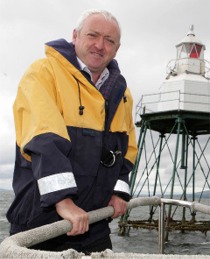|
|
Harbourmaster recalls piracy
attack
03.12.08
by Simon McGeady, Inishowen Independent
THE hijacking of the Sirius Star off the coast of
Somalia in recent weeks has thrust the issue of
modern day piracy into centre stage. Yet, lower
level piracy has been taking place on the high seas
for years, and one Strove man has first hand
experience of just such an attack.
After completing a four-year apprenticeship with the
BP tanker company, Bill McCann joined the merchant
navy when he was 23.
In 1989 he was 3rd mate on the Jostelle, a 300 metre
long bulk-carrier operating out of Madras, India
that was running iron ore to Korea and Japan, when
pirates struck.
“I was a deck officer and had first watch. It was
our captain’s last voyage. I drew his attention to a
magazine article that said there had been a pirate
attack in the area we were passing through that
night. He told me it was nonsense,” said Bill, who
now works as harbourmaster at the Port of
Londonderry.
Bill was on the bridge until midnight, when he was
relieved. He went to the ship’s bar for a few beers
then went to bed. |
 |
At 3am as the Jostelle
was passing the Anambas Islands in the South China
Sea, the pirates struck. The crew of the Jostelle
were caught unawares.
“It was pitch black. We were low in the water. They
came in plastic boats that don’t be picked up on
radar and boarded us with bamboo poles and grappling
hooks.
In those days hijacks were done for the money that
was kept in the captain’s safe.
Three pirates boarded us. They made straight for the
captain’s cabin. His door was open – after all, no
one was expecting Blackbeard to come up |
the gangway.
“One pirate held a knife to his throat and made him
open the safe. The took the $15,000, tied him up and
made a quick escape before the rest of the ship
realised what was happening.”
Looking back, Bill still shudders to think what
would have happened if the pirates had been
challenged.
“We had a crew of 26, they were mostly Koreans, but
we were unarmed so it would have been a bloodbath,”
said Bill who added, “Russian ships were armed.
Their crews shot pirates, so their ships tended to
be left alone.”
“When the Captain saw me next he said ‘don’t say one
word,’ of an I told you so.
He was really shaken up by the ordeal,” said Bill.
After that incident his company issued guidelines to
minimise the threat of piracy.
“If you were going through pirate country you’d keep
all the lights on, bolt all the doors at deck level
and lift all ladders.”
As for the current standoff with the Somali pirates
holding the crew of the Saudi super-tanker for
ransom, Bill believes the pirates’ demands will be
met.
“I would say they will pay the ransom and the
pirates will let the ship go, although they have
asked for something ridiculous like $25 million.
Paying ransom has only encouraged piracy. It’s like
winning the lottery for these Somalians. That said,
if I was sitting on board that tanker I would be
grateful to see the ransom paid. No one cares about
the lives of the people on board, what the owners
value is their cargo.”
In Bill’s opinion one solution to the current piracy
problem would be for ships to travel in convoy under
naval protection, the other is to post armed guards
on board – a solution Bill admits would have been
more effective in his day than now.
“The pirates that boarded us were armed with knives
and machetes, I don’t know how effective an armed
guard or locked doors would be against men with RPGs.
“After we were attacked we used to avoid going
through pirate country at night, then speed through
as fast as we could in daylight, I never had any
more bother with pirates,” said Bill, who continued
on deep-sea tankers until 1992. |
|

